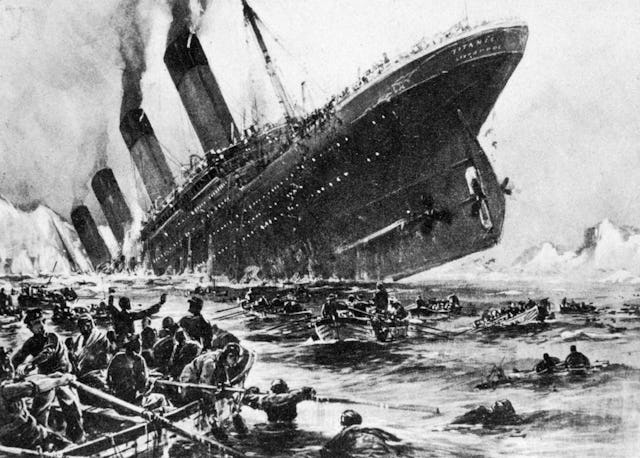What's Up With The Kids Obsessed With The Titanic?
And why is there so much overlap between them and kids who have complex theories about Anastasia Romanov?

A former colleague of mine, Janet Manley, recently wrote an article in The New York Times called “So You Think You Know a Lot About the Titanic” and I. feel. seen. The article explores the phenomenon of “Titanic kids,” children who develop a fascination with the maritime tragedy, memorizing esoteric facts about the ship’s brief, ill-fated, and glamorous maiden/final voyage. I was one, my nephew was one, and it’s kind of nice to know that there are still kids out there still fascinated 113 years after its sinking (and 28 years after the movie).
TikTok creator Robert Khederian (@notenoughangers) was also a Titanic kid and so, naturally, was interested in Manley’s article... but wasn’t exactly sold on its overarching conclusion, which noted that many children become interested in the disaster as a safe way to explore, process, and understand death.
“Picturing those people who died, picturing the ship cracking and falling down to the bottom of the ocean, it taps into a sense of awe,” clinical psychologist Debbie Sorensen noted in the article.
“I don’t know if I agree with what was said in this article,” said Khederian, before continuing. “Honestly, that didn’t explain my interest at all. I was interested in the luxury. The interiors, the lifestyle, I was one of those kids who would watch the first VHS tape of Titanic.”
At the conclusion of the TikTok, he asked followers to share, if they were Titanic obsessives, what was it that attracted them to the incident.
“It’s the perfect Venn diagram of luxury, death, engineering, and history,” said one commenter.
“The opulence and greed and then demise,” gushed another (in all caps... which I feel in my bones, to be clear).
So: high drama, for sure. But others did seem to back up the idea that it was a way to process death.
“Actually I am the [death] and grief kid,” confessed one. “It’s honestly so morbid and terrifying learning and watching people face certain [death] straight on.”
Others felt the combination of drama and tragedy is what tickled their fascination.
“The tragedy of it all got me,” shared another. “It was the grandest, most opulent ship and it sank its first time out. The husbands staying behind, the band playing… I loved how dramatic it all felt to me at 5 years old.”
Indeed, it’s almost certainly not coincidental that many children’s fascination with the Titanic occurs around the same time they’re developmentally able to fully understand death, which happens somewhere between 5 and 7. But a deeper understanding — and coming to terms with the universality and finality of shuffling off this mortal coil — happens throughout the tween and teen years... and, in my experience, also your 20s, 30s, and into your 40s.
So between those deeper questions and humans’ natural tendency to be attracted to glitz and glamour, it’s no surprise that we’re so taken in by the grand tragedy of the Titanic... or why there tends to be an overlap between Titanic kids and kids who are interested in the Anastasia Romanov, Henry VIII and his doomed wives, the Salem Witch Trials, and Pompeii!
So don’t be alarmed the next time your child comes home with yet another I Survived...book. They’re not morbid. They’re processing.